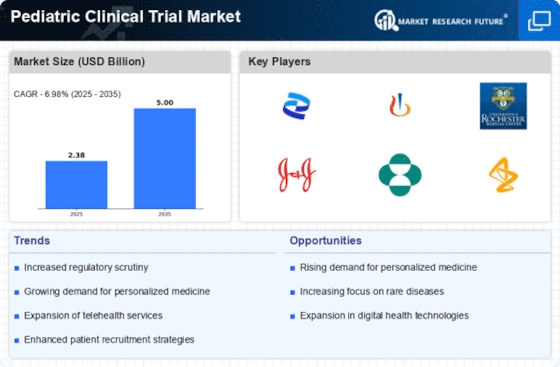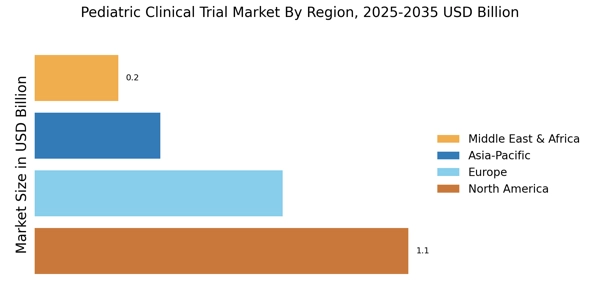Rising Incidence of Pediatric Diseases
The Pediatric Clinical Trial Market is experiencing a notable increase in the incidence of various pediatric diseases, including chronic conditions such as asthma, diabetes, and obesity. This rise necessitates the development of targeted therapies, thereby driving the demand for clinical trials focused on children. According to recent data, pediatric diseases account for a significant portion of healthcare expenditures, prompting pharmaceutical companies to invest in research and development. The need for effective treatments tailored to the unique physiological characteristics of children is becoming increasingly apparent, leading to a surge in clinical trial activities. As a result, the Pediatric Clinical Trial Market is likely to expand, with more studies being initiated to address these pressing health concerns.
Enhanced Collaboration Among Stakeholders
Collaboration among various stakeholders, including pharmaceutical companies, academic institutions, and regulatory bodies, is becoming more pronounced within the Pediatric Clinical Trial Market. This trend is fostering an environment conducive to innovation and efficiency in trial design and execution. Partnerships are being formed to share resources, knowledge, and expertise, which can lead to more robust clinical trial outcomes. For instance, initiatives that involve patient advocacy groups are helping to ensure that trials are designed with the needs of pediatric patients in mind. This collaborative approach not only enhances the quality of research but also accelerates the development of new therapies, thereby propelling the growth of the Pediatric Clinical Trial Market.
Increased Investment in Pediatric Research
Investment in pediatric research is witnessing a significant uptick, which is positively impacting the Pediatric Clinical Trial Market. Funding from both public and private sectors is being directed towards understanding pediatric diseases and developing new treatment modalities. For example, government initiatives aimed at promoting pediatric research are providing grants and incentives for clinical trials focused on children. This influx of capital is essential for conducting comprehensive studies that address the unique challenges associated with pediatric populations. As a result, the Pediatric Clinical Trial Market is likely to benefit from a more diverse pipeline of therapies, ultimately improving health outcomes for children.
Growing Awareness of Pediatric Health Issues
There is a growing awareness of pediatric health issues among healthcare professionals, parents, and policymakers, which is driving the Pediatric Clinical Trial Market. This heightened awareness is leading to increased advocacy for research focused on children's health, resulting in more clinical trials being conducted. Educational campaigns and outreach programs are helping to inform stakeholders about the importance of pediatric research and the need for effective treatments. As awareness continues to rise, it is likely that more resources will be allocated to pediatric clinical trials, thereby expanding the market. The Pediatric Clinical Trial Market stands to benefit from this trend as it aligns with the broader goal of improving health outcomes for children.
Regulatory Incentives for Pediatric Drug Development
Regulatory bodies are increasingly offering incentives to encourage the development of pediatric drugs, which is significantly influencing the Pediatric Clinical Trial Market. These incentives may include extended patent exclusivity, grants, and expedited review processes for pediatric indications. Such measures are designed to stimulate pharmaceutical companies to invest in research that targets pediatric populations, which have historically been underrepresented in clinical trials. The presence of these regulatory frameworks is likely to enhance the feasibility of conducting pediatric trials, thereby increasing the number of studies initiated. Consequently, the Pediatric Clinical Trial Market is expected to grow as more companies seek to capitalize on these favorable conditions.

















